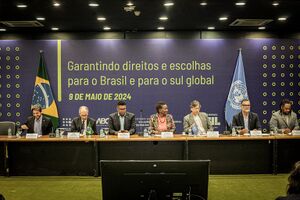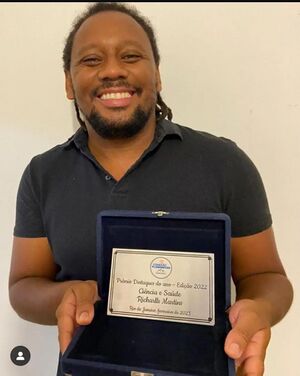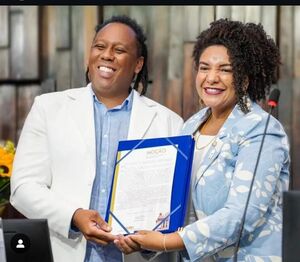Champion of Public Health and Social Justice Richarlls Martins
He is the President of the National Commission on Population and Development (CNPD) of Brazil and holds a Ph.D. in Public Health from the Oswaldo Cruz Foundation (Fiocruz). He has a Master’s degree in Public Policy in Human Rights and a Bachelor's degree in Psychology from the Federal University of Rio de Janeiro (UFRJ). With a career that spans academia and community work, Richarlls stands out for his defense of human rights and his commitment to comprehensive health for vulnerable populations, especially in the favelas. He is the Coordinator of the Integrated Health Plan for Favelas in Rio de Janeiro, and he is also a consultant to the United Nations Population Fund in Brazil and the Pan American Health Organization, being one of the main advocates in the fight for equity and social justice in health and development policies in Brazil.
Authorship: Information in this entry reproduced by the Marielle Franco Favelas Dictionary Team, based on the official website of FIOCRUZ [1][2]
About
Richarlls Martins is the current President of the National Commission on Population and Development (CNPD) of Brazil and the Executive Coordinator of the Integrated Health Plan for Favelas in Rio de Janeiro. His career is marked by his defense of human rights, the promotion of public health policies, and leadership in initiatives specifically targeting vulnerable populations. Richarlls holds a Ph.D. in Public Health from the Oswaldo Cruz Foundation (Fiocruz), a Master’s degree in Public Policy in Human Rights, and a Bachelor’s degree in Psychology from the Federal University of Rio de Janeiro (UFRJ). He is the first Black person to occupy the presidency of the CNPD, reinforcing his commitment to plurality and diversity in the field of Brazilian public policies.
In addition to his national work, Richarlls Martins represents Brazil in international forums such as the World Health Assembly and the United Nations (UN), and he serves as a consultant to the United Nations Population Fund and the Pan American Health Organization. His management at CNPD aims to strengthen social participation in public policy formulation, as well as expand dialogue between different sectors of society to guarantee rights and promote social justice.
Childhood and Education
Richarlls Martins was born in Paracambi, in the Baixada Fluminense region of Rio de Janeiro, and became involved in social movements from an early age. At the age of 15, he joined the Student Council at the Technical School of the Federal Rural University of Rio de Janeiro (UFRRJ), where he completed high school. Later, he moved to Rio de Janeiro to study Psychology at the Federal University of Rio de Janeiro (UFRJ), where he became engaged in community projects focused on education and health in favelas and peripheries. During his undergraduate studies, he coordinated the UFRJ Pre-University Course in Nova Iguaçu, in the Cerâmica favela, where he witnessed firsthand the impact of violence and the lack of public policies.
His interest in social policies and public health led him to pursue a Master’s degree in Public Policy in Human Rights at UFRJ, where he developed a dissertation that won the Affirmative Action Award for its originality and contribution to reducing social inequalities. Subsequently, Richarlls advanced his studies at Fiocruz, completing his Ph.D. in Public Health at the Fernandes Figueira Institute (IFF/Fiocruz). His research focused on the health of the Black population and the development of public health policies that consider social inequalities and the vulnerabilities of peripheral territories.
Career and Contributions to Public Health
Richarlls Martins began his career in Social Psychology and Public Health, focusing on youth policies and health for marginalized populations. In 2008, he was elected the youngest delegate to represent the state of Rio de Janeiro at the National Human Rights Conference. Between 2011 and 2015, he was the youngest member of the Technical Committee on the Health of the Black Population at the Ministry of Health, during which time he contributed to the formulation of public policies aimed at racial equity and combating structural racism in the health sector.
In 2014, he co-founded the Brazilian Network of Population and Development (Rebrapd) with other activists in the field, and he has coordinated the entity ever since. His work has expanded to include the defense of the rights of Black and peripheral populations, making him one of the leading references in comprehensive health and human rights in Brazil. Internationally, he has represented Brazil in over 45 countries and participated in the development of global agendas such as the UN’s 2030 Agenda. During this period, he also served as a technical advisor to various public bodies, including the State Secretariat for Human Rights of Rio de Janeiro, the General Secretariat of the Presidency of the Republic, and the Ministry of Health.
Coordination of the Integrated Health Plan for Favelas in Rio de Janeiro
During the COVID-19 pandemic, Richarlls Martins served as the Executive Coordinator of the Integrated Health Plan for Favelas in Rio de Janeiro, an inter-institutional project that brought together Fiocruz, UFRJ, UERJ, PUC-RJ, UENF, IFF, ABRASCO, SBPC, and the Legislative Assembly of the State of Rio de Janeiro (ALERJ). The plan was created in April 2020 as an emergency response to the pandemic's impact on favelas, with the goal of mitigating the effects of COVID-19 and promoting comprehensive health in the most vulnerable communities through coordinated actions with grassroots organizations and collectives operating in these territories.
In May 2020, the Emergency Plan for COVID-19 Response in Favelas was launched, and in August of the same year, ALERJ allocated R$ 20 million to Fiocruz for the implementation of the plan's actions. The funds were distributed through public calls held between 2021 and 2023, resulting in the support of 146 projects that benefited more than 170 favelas in the state of Rio de Janeiro.
In addition to promoting health actions, the plan developed cultural and educational activities and entrepreneurship workshops, including therapeutic sessions, training workshops, school support, and strategies to reinforce communication for popular health surveillance. These activities were carried out in partnership with local collectives and institutions, expanding social participation and promoting solidarity and democracy in favelas.
In 2024, Fiocruz allocated an additional R$ 5 million to expand the Integrated Plan, with the launch of a new public call that supported 56 new projects. As a result, the territorial reach of the plan expanded to 33 municipalities in Rio de Janeiro, including Barra Mansa, Belford Roxo, Cabo Frio, and Cachoeiras de Macacu. The initiative also developed a specific strategy for Rocinha, with the aim of mapping popular health surveillance actions and coordinating new health policies for the territory.
Through this inter-institutional coordination and direct engagement with territories, the Integrated Health Plan for Favelas contributes not only to the strengthening of the Unified Health System (SUS) but also to the development of new social technologies that promote comprehensive and integrated health to address inequalities in the favelas and peripheries of Rio de Janeiro.
Presidency of the National Commission on Population and Development (CNPD)
In 2024, Richarlls Martins assumed the presidency of CNPD with a dual sense of collective gratitude and public commitment. The reinstatement of the CNPD after a period of dismantling social participation under the previous government was a significant milestone, and Richarlls views his appointment as an opportunity to reaffirm the role of social participation in the formulation of public policies in Brazil. His leadership is guided by the defense of public inclusion and the promotion of policies that prioritize human rights and sustainable development, in line with the UN's 2030 Agenda.
As president, Richarlls emphasizes the importance of collective and collaborative management, bringing together different sectors and voices to promote a fairer and more democratic society. Representing Brazil in international forums such as the World Health Assembly, he stressed the importance of including social participation as a fundamental element for the effectiveness of public health policies. His leadership aims to ensure that CNPD actively contributes to the formulation of public policies that promote equity, diversity, and social justice.
Awards and Recognitions
Outstanding Achievement Award 2022 – Science and Health Category
In 2022, Richarlls and his team were awarded the Outstanding Achievement Award in the Science and Health category, presented by the Conexão Fluminense portal. The award recognized the excellence and impact of the inter-institutional actions led by the Fiocruz Plan for COVID-19 Response in Favelas, promoting comprehensive health and supporting civil society in peripheral territories. Richarlls emphasized that the award reflects the collective work carried out in partnership with universities, associations, and favela networks, demonstrating the power of science and health to transform the lives of those in greatest need.
Motion of Applause and Praise by the Legislative Assembly of Rio de Janeiro (ALERJ)
In February 2023, Richarlls Martins received a Motion of Applause and Praise from the Legislative Assembly of the State of Rio de Janeiro (ALERJ), proposed by State Deputy Renata Souza. This recognition followed his trajectory as a network weaver and promoter of rights-based agendas rooted in diversity and public health. Deputy Renata Souza highlighted his ability to navigate between peripheral communities and international decision-making spaces such as the UN, promoting inclusive and transformative public policies. The recognition also praised his leadership in connecting local communities with the global political landscape, articulating innovative solutions for health and human rights issues.
Commemorative Plaque – Fiocruz Plan for COVID-19 Response in Favelas
Richarlls was also honored with a commemorative plaque in recognition of the work carried out under the Fiocruz Plan for COVID-19 Response in Favelas. The plaque was awarded in 2022, reinforcing the impact of the project and its contribution to the construction of innovative and sustainable responses that expand the right to health in the favelas of Rio de Janeiro. Richarlls dedicated this honor to the team he works with, underscoring the importance of collaborative work for the success of innovative initiatives in peripheral territories.
Contact
See Also
- FIOCRUZ e seu apoio às Favelas
- 54x Favelas
- 90x Favelas
- Saúde na Favela numa Perspectiva Antirracista (cartilha)
- Cadu Barcellos (personalidade)
- Favelas contra o coronavírus (Coletivo)
- Guilherme Simões






